|
|
|
Sort Order |
|
|
|
Items / Page
|
|
|
|
|
|
|
| Srl | Item |
| 1 |
ID:
147641
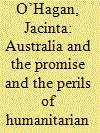

|
|
|
|
|
| Summary/Abstract |
Humanitarian diplomacy has always been a crucial element of humanitarianism, however it is now becoming a more prominent element of states’ foreign policies. It holds many attractions and much promise. It provides states with a way of expressing important qualities of international empathy and solidarity and can also enhance a state’s international reputation and provide valuable means for building relationship of trust and cooperation. This can in turn can be conducive to a state’s broader foreign policy objectives. However, there are also perils to the incorporation of humanitarian diplomacy into a state’s foreign policy. It can generate ambiguity and even conflict within a state’s diplomatic endeavours due to tensions between humanitarian and broader national interests. In exploring these issues it is useful to distinguish between humanitarian diplomacy and humanitarianism as diplomacy. This article explores these issues in relations to Australia’s diplomacy. It argues that Australia has actively engaged in humanitarian diplomacy and humanitarianism as diplomacy. Whilst the two are often complementary, there are areas in which they have been in tension and even at odds. This has implications for Australia’s international reputation but also for its capacity to undertake genuine and effective humanitarian action.
|
|
|
|
|
|
|
|
|
|
|
|
|
|
|
|
| 2 |
ID:
147642
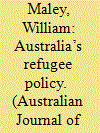

|
|
|
|
|
| Summary/Abstract |
Refugee policy involves a two-level game. For Australia since approximately 1998, the politics of refugees has been toxically affected by domestic politics. This has had potentially negative effects on Australia’s reputation and soft power. This article provides an overview of the issue, explores the ways in which considerations of domestic politics have come increasingly to shape Australia’s policy and concludes with a discussion of the consequences of Australia’s treatment of refugees for its diplomacy and soft power.
|
|
|
|
|
|
|
|
|
|
|
|
|
|
|
|
| 3 |
ID:
147639


|
|
|
|
|
| Summary/Abstract |
As part of its economic diplomacy, Australia has directed intense effort into both bilateral and plurilateral trade negotiations such as the Trans-Pacific Partnership. According to then Minister for Trade and Investment Andrew Robb, with no major multilateral trade deal in decades, you have to ‘row your own boat’ or risk missing out. With the fundamentals of trade and the nature of trade negotiations changing, trade liberalisation has become an increasingly sophisticated and difficult negotiating area. A case study of the controversial TPP shows the tensions for a middle power navigating this space. The benefits of the TPP are contested and the government faces criticism of the adverse impacts of the agreement, especially investor-state dispute settlement clauses, impact on human rights and suspicion that the TPP is motivated by geopolitical drivers. In order not to lose more than it gains in moving away from the multilateral trade system, Australia must ensure that trade agreements are consistent with WTO rules and have open and fair accession regimes as a basis for signing. Finally, there is the need for higher levels of transparency and democratic accountability than has historically applied. A new white paper is necessary to make the case for trade liberalisation.
|
|
|
|
|
|
|
|
|
|
|
|
|
|
|
|
| 4 |
ID:
147640
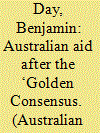

|
|
|
|
|
| Summary/Abstract |
In the decade preceding the election of the Abbott Coalition Government in 2013, a so-called ‘golden consensus’ governed Australian aid policy. During this period Australia’s aid spending increased by over 80% in real terms. However, after winning government the 2013 Federal Election, the Abbott Government made a series of significant and unexpected aid policy decisions, cutting the aid budget three times in fifteen months and integrating AusAID, Australia’s aid agency, into the Department of Foreign Affairs and Trade. This article considers the future role of aid in Australia’s diplomacy primarily by engaging with a prior question: how was it possible for the golden consensus to be uprooted so easily? Conducting a post-mortem reveals that Australia’s development constituency bears some responsibility for the fragility of the consensus. This analysis also reveals the critical role the development constituency will play in determining the extent to which Australia is able to embrace the ‘beyond aid’ agenda. To meet this contemporary challenge, the development community must heed the lessons of the collapse of the golden consensus and, in particular, overcome its reticence to engage in broader foreign policy debates.
|
|
|
|
|
|
|
|
|
|
|
|
|
|
|
|
| 5 |
ID:
147634
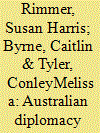

|
|
|
|
|
| Summary/Abstract |
Peter Varghese AO, Secretary of the Department of Foreign Affairs and Trade (DFAT), refers to diplomacy as ‘the compass by which Australia makes its way in the world’. Its core task – to advance the nation’s security and prosperity – remains unchanged across decades.
|
|
|
|
|
|
|
|
|
|
|
|
|
|
|
|
| 6 |
ID:
147635


|
|
|
|
|
| Summary/Abstract |
People don’t generally read books by Henry Kissinger for the pictures. But if you do flick through the 912 pages of his 1994 work, Diplomacy, the pictures will give you a particular sense of one side of international relations. On page 78, there’s a painting depicting the scene at the Congress of Vienna in 1815, the conference of ambassadors and leaders that reshaped Europe after the Napoleonic Wars. Opposite the title page, he’s got a sketch of an ornate state room in Versailles, showing Woodrow Wilson addressing the Paris Peace Conference in January 1919.
|
|
|
|
|
|
|
|
|
|
|
|
|
|
|
|
| 7 |
ID:
147636


|
|
|
|
|
| Summary/Abstract |
Kim Beazley, one of the greats on the Australia-United States relationship, is well into his sixth year as Australia’s Ambassador to our most important ally when we sit down to discuss the relationship. He also comes with a lifetime of practice engaging and building the relationship as Leader of the Opposition, Leader of the Labor Party, Deputy Prime Minister and a host of other Australian parliamentary positions.
|
|
|
|
|
|
|
|
|
|
|
|
|
|
|
|
| 8 |
ID:
147638
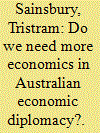

|
|
|
|
|
| Summary/Abstract |
Economic diplomacy—that is, informal and formal processes and links between states and non-state actors on international economic issues—is a current focus of Australian foreign policy. The Department of Foreign Affairs and Trade’s stated economy diplomacy aims are liberalising trade, boosting economic growth, encouraging investment and assisting business. If Australia is to embrace a genuine and effective notion of economic diplomacy there are two problems to be overcome. First, DFAT’s economic diplomacy framework is incomplete and misses the bigger economic picture, particularly the role of Australia’s key economic agencies, Treasury and the Reserve Bank of Australia. Second, DFAT does not consistently apply economic principles to foreign affairs issues including trade, foreign aid and the global investment agenda. Going forward, Australia should abandon the focus on the four narrow pillars and instead focus on developing a clear, coordinated international economic strategy that articulates Australia’s core international economic objectives and priorities.
|
|
|
|
|
|
|
|
|
|
|
|
|
|
|
|
| 9 |
ID:
147637


|
|
|
|
|
| Summary/Abstract |
There is scepticism about whether a state like Australia can secure its interests and exercise influence on the United Nations Security Council (UNSC). A case study of Australia’s experience as a UNSC member in 2013–2014 shows that it directly influenced UNSC decision-making in a number of ways: first, in the response to the MH17 incident; second, pushing forward UNSC practice through the first-ever resolutions on both ‘small arms and light weapons’ and police in peacekeeping; and third, as chair of three sanctions committees, influencing the decision-making environment towards greater transparency. While Australia did not achieve all its objectives, it made its views well-known. A second case study demonstrates that Australia’s opportunities to influence UNSC decision-making are not limited to stints of membership. Australia was able to achieve many of its foreign policy objectives in East Timor in 1999 through strategically engaging with key UNSC players through an informal diplomatic grouping: the Core Group on East Timor. Both case studies show that Australia’s diplomatic engagement with the UNSC is desirable, necessary and strategic, whether or not it is a current or prospective member.
|
|
|
|
|
|
|
|
|
|
|
|
|
|
|
|
| 10 |
ID:
147643
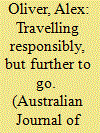

|
|
|
|
|
| Summary/Abstract |
This article considers the transformations taking place in the consular landscape and the resulting pressures on departments of foreign affairs both in Australia and elsewhere. For Australia, the challenges are particularly compelling. As the Lowy Institute has observed in successive reports, Australia’s anaemic overseas representation renders the growing consular load an even more formidable problem. When crises strike, resources are diverted both within government and within the Department of Foreign Affairs and Trade, skewing other priorities. The second part of the article analyses government responses to these challenges. It examines the new focus on consular diplomacy and the government’s first formal consular strategy. It assesses the recent modest expansion of Australia’s overseas diplomatic network, together with the steps taken to enhance international cooperation on consular issues. The article concludes that while the problems facing Australia’s consular service remain pressing, some progress has been made.
|
|
|
|
|
|
|
|
|
|
|
|
|
|
|
|
|
|
|
|
|